Book contents
- Frontmatter
- Contents
- List of Tables and Figures
- Preface
- Acknowledgements
- 1 Introduction to Business Groups and their Strategies
- 2 Business Groups across the Globe
- 3 Product Diversification and Performance: Measurement and Historical Relationship
- 4 Conceptual Framework and Research Methodology
- 5 Empirical Results and Managerial Implications
- 6 Case Analyses of Business Groups' Strategies
- 7 Summary of the Work
- References
- Index
- About the Authors
4 - Conceptual Framework and Research Methodology
Published online by Cambridge University Press: 13 July 2022
- Frontmatter
- Contents
- List of Tables and Figures
- Preface
- Acknowledgements
- 1 Introduction to Business Groups and their Strategies
- 2 Business Groups across the Globe
- 3 Product Diversification and Performance: Measurement and Historical Relationship
- 4 Conceptual Framework and Research Methodology
- 5 Empirical Results and Managerial Implications
- 6 Case Analyses of Business Groups' Strategies
- 7 Summary of the Work
- References
- Index
- About the Authors
Summary
Our first three chapters stress on the need to look differently at business groups; which are, in any way, the state of affairs in most parts of the world, except possibly in the Anglo-Saxon economies. In most economies across Europe and much of Asia and Africa, such business groups constitute a significant part of the business landscape. Business groups and their portfolio of companies have come under great criticism in recent decades, particularly from researchers using Anglo-Saxon structures of financial markets (see, for example, Claessens et al., 2000) – pitting often the interest of the financial investors (including small retail investors) with the controlling family business group. The existence of business groups have been widely ascribed to the weakness or non-development of markets, particularly of finance, in developing countries (see, for example, Khanna and Palepu, 1997). From a strategy perspective, however, it needs to be emphasized that business groups play a very important governance role; a role that a financial market possibly cannot replace (Saha et al., 2011).
Bank-based governance in Germany and Japan and public executive dominated governance in the U.S., Korea, France, China, and even (recently) Japan and Germany point out the importance of non-market executive-based governance that is not always linked to finance. In fact, the executive ambition in Japanese MITI (Ministry of International Trade and Industry) in terms of creating globally competitive domestic enterprises and acquiring technological capability1 was very important in shaping up investment direction of several large Japanese business groups known as Keiretsus or Zaibatsus. These were large capitalist enterprises of Japan before World War II, similar to cartels or trusts usually organized around a single family. The intent of the business family and the financial investor cannot thus be equated (Saha et al., 2011). We state that these two factions connected to an affiliate constitute different stakeholders and the primacy of the financial stakeholder (of an affiliate firm) cannot be over-riding.
Business Group, thus, is a supra-firm institution – its writ runs across several independent often-listed firms that constitute a closed group network (Saha et al., 2011). The institution of the business group, thus, throws up unique set of governance issues.
Information
- Type
- Chapter
- Information
- Indian Business Groups: Strategy and Performance , pp. 78 - 111Publisher: Foundation BooksPrint publication year: 2015
